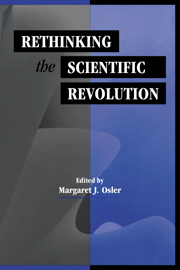Preface
Published online by Cambridge University Press: 25 October 2009
Summary
The most satisfying tribute a scholar can receive is serious consideration of his or her work by other scholars. When Betty Jo Teeter Dobbs died suddenly and prematurely on March 29, 1994, 1 decided to invite a number of her colleagues, students, and friends to contribute papers to a volume in memory of her scholarly interests and the impact of her work. Dobbs's groundbreaking studies of the meaning of Newton's alchemy irrevocably altered our understanding of the Scientific Revolution and early modern natural philosophy. The scholarship of her associates reflects this impact – in spirit as well as detail. This volume stands as a tribute to her contributions.
Dobbs herself articulated some of the far-reaching ramifications of her work on Newton in her History of Science Society Distinguished Lecture, “Newton as Final Cause and First Mover,” in which she challenged the received understanding of the Scientific Revolution. This essay, which was originally published in Isis, opens the volume and sets the themes for the chapters that follow. Richard S. Westfall contributed an essay that went head-to-head with Dobbs's and which provides an eloquent defense of the utility – indeed necessity – of thinking in traditional terms about the Scientific Revolution. The debate between these two giants about the central concept in our field provides the broader context for the chapters in the volume. Subsequent events altered the direction of the volume after it was well underway. Westfall's sudden death on August 21, 1996, reinforced my decision to construct the volume in terms of their debate and, at the same time, to honor Westfall's memory along with Dobbs's.
- Type
- Chapter
- Information
- Rethinking the Scientific Revolution , pp. xi - xiiPublisher: Cambridge University PressPrint publication year: 2000



